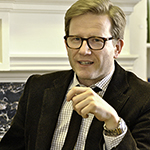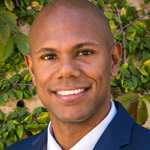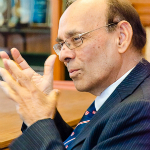Pour la dernière édition de Focus online de 2020, nous vous proposons un pléthore de nouvelles facultaires, des promotions au sein du corps professoral, ainsi que des articles, des manifestes, des rapports déposés auprès du gouvernement et des interventions médiatiques sur des sujets aussi divers que les effets économiques de la pandémie COVID-19, la protection des travailleurs essentiels, la vie privée des Canadiens, la guerre dans l’espace et les élections américaines.
 Helge Dedek promu au rang de professeur titulaire
Helge Dedek promu au rang de professeur titulaire
Nouvelles de la Faculté, 15 décembre 2020
La Faculté de droit a le plaisir d’annoncer que le professeur Helge Dedek sera promu au rang de professeur titulaire le 1er janvier 2021.
« Cette reconnaissance du travail exceptionnel de notre collègue en droit comparé et transnational, en histoire et en théorie du droit me fait vraiment plaisir, a déclaré le doyen Robert Leckey. Nos cohortes de première année apprécient particulièrement ses talents de pédagogue, alors que sont jetées les bases de notre programme intégré. Et grâce à ses recherches, le professeur Dedek continue d’enrichir la forte tradition de droit civil de la Faculté de par ses perspectives internationales. » Lire l’annonce.
 Reading Camus in The Time of Plague and Polarization
Reading Camus in The Time of Plague and Polarization
Mugambi Jouet, The Boston Review, 7 December 2020
This year has not only seen revived interest in Albert Camus’s novel The Plague (1947), it also marks a key anniversary: Camus’s death at the age of forty-six in a sudden car crash sixty years ago. The occasion has led to commemorations in France but it has been understandably overshadowed in the United States by COVID-19, the fateful presidential election, and beyond. Yet Camus is a thinker for our age of pandemic and polarization. He sought to transcend the divides of his own epoch by warning against dogmatic ideologies on both the left and right, all while earnestly defending democracy and humanity. His writings have acquired an ageless quality. The Plague recounted how a deathly virus destabilized society. It embodied the legacy of an author who passionately explored how to live in an “absurd” world where relentless injustice can test our hope. Keep reading.
 ‘War in space’ would be a catastrophe
‘War in space’ would be a catastrophe
Ram Jakhu, Kuan-Wei Chen, LLM’12, and Steven Freeland, The Conversation, 30 November 2020
Professor Jakhu and his co-authors argue that a return to rules-based cooperation is the only way to keep space peaceful: “To ensure the fragile and shared domain of outer space does not become an arena for conflict, the rules that apply to any military uses of space need to be understood, respected and further developed. Failure to do so could lead to devastation, disruption and impact on civilian lives, particularly in the largest and most powerful countries like the US, whose economies and societies are heavily dependent on space infrastructure.” Keep reading.
 Investing toward the future rather than the past
Investing toward the future rather than the past
Richard Gold, Aled Edwards, and Christopher McCabe, The Globe and Mail, 30 November 2020
Canada will spend billions of dollars on the economic recovery following the COVID-19 crisis. The question is not whether governments will spend, but whether they will pour tax dollars into existing industries that are in decline or in industries of future growth. We propose the latter, with investments in four priority areas: 1) labour market transition; 2) climate change; 3) digital services and training; and 4) open science drug discovery. Keep reading.
 Irwin Cotler nommé Envoyé spécial pour la préservation de la mémoire de l’Holocauste et la lutte contre l’antisémitisme
Irwin Cotler nommé Envoyé spécial pour la préservation de la mémoire de l’Holocauste et la lutte contre l’antisémitisme
Nouvelles de la Faculté, 26 novembre 2020
Le professeur émérite l’honorable Irwin Cotler, OC, OQ, PC, BA’61, BCL’64, LLD’19, a été nommé par le premier ministre du Canada Envoyé spécial pour la préservation de la mémoire de l’Holocauste et la lutte contre l’antisémitisme. Le professeur Cotler devient ainsi le premier titulaire de ce poste destiné à préserver les histoires des survivant.e.s de l’Holocauste en les transmettant aux plus jeunes générations, ainsi qu’à promouvoir et à défendre le pluralisme, l’inclusion et les droits de la personne. Lire l’annonce.
Introduction à la fiducie québécoise de données
Anne-Sophie Hulin, Blogue du Laboratoire de cyberjustice, 26 novembre 2020
Le traitement des données personnelles à des fins analytiques par des organisations de tout type fait face aujourd’hui à une érosion grandissante de la confiance publique. En effet, les récentes affaires en lien avec gouvernance des données urbaines ou encore le recours à la reconnaissance faciale sans consentement et dans un contexte commercial ont accentué cette défiance publique compte tenu des atteintes à la vie privée et de l’imparable constat que les individus perdent le contrôle des données qu’ils génèrent au quotidien. Dès lors, le besoin de trouver de nouvelles solutions pour restaurer la confiance collective se révèle une priorité de plus en plus pressante… Lire le billet.
 Recalibration of the Sustainable Development Agenda: Insights from the Conflict in Yemen
Recalibration of the Sustainable Development Agenda: Insights from the Conflict in Yemen
Prof. Nandini Ramanujam and LLM candidate Alexander Agnello, BCL/LLB’18, McGill Journal of Sustainable Development Law, vol. 15, no. 1
Fragility and conflict are responsible for eighty percent of humanitarian assistance needs. Many countries amidst conflict and violence have seen erosion of development gains made before and during the Millennium Development Goals (MDGs). Against this distressing reality, we propose a working framework for the implementation of the Sustainable Development Goals (SDGs) – in fragile and conflict-affected states (FCAS) – by illustrating the case of Yemen. United Nations agencies continue to make the inflexible claim that the implementation of the SDG Agenda should be guided by the principles of indivisibility and universality. The principle of indivisibility demands that the Goals be implemented in a holistic, non-selective manner, while the principle of universality demands that they be implemented in full. Read the paper [.pdf].
 Mtre Daniel Boyer promoted to full librarian
Mtre Daniel Boyer promoted to full librarian
McGill Library Matters, 24 November 2020
Congratulations to Mtre Daniel Boyer, Ad. E., who was recently promoted to full librarian.
As Wainwright Librarian and Head of the Nahum Gelber Law Library, Mtre Daniel Boyer is dedicated to sharing his knowledge and understanding of legal literature within McGill University as well, as with the legal communities in Quebec, Canada, and abroad. Read the announcement.
La professeure auxiliaire et ancienne juge de la Cour d’appel du Québec Louise Otis, nommée au Conseil de justice interne de l’Organisation des Nations Unies
Couverture médiatique sur la prof. auxiliaire Louise Otis:
- Une juge québécoise à l’ONU. Louise Otis « de retour à la maison », La Presse, 23 novembre 2020
- La Québécoise Louise Otis nommée au Conseil de justice interne de l’ONU, TVA Nouvelles, 12 novembre 2020
Diversity in the corporate world
Professor Darren Rosenblum – who will join McGill Law in August 2020 – has a diversity column in Forbes. Here are some recent contributions.
- “Will Quotas For Women Lead To Broader Diversity?.” Forbes, 18 November 2020
- “Amy Coney Barrett, LGBT Rights and Judicial Legitimacy.” Forbes, 24 October 2020
- “California Pioneers New Quotas For People Of Color & LGBT People.” Forbes, 5 October 2020
David Howe and Mark Antaki trouble Law’s Sensorium
Adjunct Professor David Howe recently wrapped up a research project on “Law and the Regulation of the Senses: Explorations in Sensori-Legal Studies”, which include a special issue of the Canadian Journal of Law and Society no. 34(2) entitled “Troubling Law’s Sensorium,” (open source) with a prologue by Howes and an epilogue by Professor Mark Antaki.
The project also has its own website, Law and the Senses, which features, among other things, contributions by several McGill Law students, including Simcha Walfish, Jessye Kilburn, Ryan Yevcak, Eva Monteiro, Danielle Maor, Lily Maya Wang, Alexander Sculthorpe and Olivia Khazoum.
 Yaëll Emerich promue au rang de professeure titulaire
Yaëll Emerich promue au rang de professeure titulaire
Nouvelles de la Faculté, 13 novembre 2020
Nous sommes ravis d’annoncer que la professeure Yaëll Emerich, qui s’est jointe à la Faculté de droit en 2006, a été promue au rang de professeure titulaire en date du 1 octobre 2020. Lire la nouvelle.
Ignacio Cofone authors policy report for the Office of the Privacy Commissioner of Canada
Faculty News, 13 November 2020
The Office of the Privacy Commissioner (OPC) of Canada released on November 12 a report authored by Professor Ignacio Cofone which will inform the OPC’s recommendations for privacy law reform in Canada. Professor Cofone’s report, titled “Policy Proposals for PIPEDA Reform to Address Artificial Intelligence”, sets out recommendations that would modernize PIPEDA in a way that protects privacy and human rights, while also acknowledging businesses’ interests in view of AI. Read the announcement.
Professor Cofone has also recently edited a new collection: The Right to Be Forgotten: A Canadian and Comparative Perspective (Routledge, 2020), which explores the evolution of the right to be forgotten, its challenges, and its impact on privacy, reputation, and online expression in Canada and in the international context.

Strategic Games and Algorithmic Secrecy
Ignacio Cofone and Katherine J. Strandburg, McGill Law Journal, volume 64, no. 6
In their timely paper, Professors Confone and Strandburg (NYU Law) challenge the claim that algorithmic decision-making processes should remain opaque or secret because otherwise decision subjects will “game the system.” Read the paper.
Conversations sur les élections aux USA : entretiens des professeurs Mugambi Jouet et Jason Opal
Dans son article « Élections sur fond de divisions », l’étudiante au BCL/JD Gabrielle Genest a brossé un récapitulatif de l’analyse faite par les professeurs Jouet et Opal sur les élections aux États-Unis (Le Délit français, 10 novembre 2020). On pourra aussi ré-écouter leurs conversations sur YouTube :
Alumni Webcasts. Focus on the U.S. elections – part one (22 October) https://www.youtube.com/watch?v=Ss2rjpDfGNo
Alumni Webcasts. Focus on the U.S. elections – part one 2 (5 November) https://www.youtube.com/watch?v=7W9LHOei8Iw
 Human Rights Workshop: Adelle Blackett Reflects on Protecting Essential Workers
Human Rights Workshop: Adelle Blackett Reflects on Protecting Essential Workers
Yale Law School News, 13 November 2020
Professor Adelle Blackett, Ad. E., F.R.S.C., discussed the urgency of global social protection for essential workers at the 12 November 2020 Human Rights Workshop titled “COVID-19, Essential Workers and Dignity at Work: Rethinking Social Protection.” Blackett, who holds a Canada Research Chair in Transnational Labour Law and Development, shared findings from her contributions to the recently published Éditions Le Seuil book on the #DemocratizingWork manifesto. She lamented how, in light of COVID-19, people were “content to accept the invisibility of workers [and to] acknowledge the magnitude of their contribution to our ability to shelter-in-place,” but unwilling to call for “structural change” and the recognition of “labor rights as human rights.” Keep reading.
More coverage
- « Le manifeste travail d’Adelle Blackett : la volonté d’humaniser les entreprises » (17:11), Balado Plus on est de fous, plus on lit, ICI Radio Canada Première, 2 décembre 2020
 Will an International Investment Court Restore Legitimacy to Investor State Dispute Settlement?
Will an International Investment Court Restore Legitimacy to Investor State Dispute Settlement?
Professor Andrea Bjorklund, who holds the L. Yves Fortier Chair in International Arbitration and International Commercial Law and serves as Associate Dean (Graduate Studies), gave an online lecture on international dispute settlement for the Audiovisual Library of International Law of the United Nations on 8 November 2020, which is now publicly available. Watch her lecture.
Professor Adelle Blackett awarded Principal’s Prize in Excellence in Teaching
Neale McDevitt, McGill Reporter, 5 November 2020
Adelle Blackett came to McGill in 2000, from Geneva, Switzerland, where she was a labour law specialist at the United Nations’ International Labour Organization. It’s just one example of the incredible breadth of knowledge and experience that Blackett brings to every course she teaches – outstanding assets that helped earn her the 2020 Principal’s Prize in Excellence in Teaching – Full Professor category, which was announced in conjunction with Fall Convocation.
“I feel incredibly privileged to be able to encourage students to believe in themselves and in their ability to thrive. I also feel like I learn constantly from my students,” says Blackett. “But good teaching is hard work. There are no shortcuts. If this is a challenge, it is one I am happy to have the opportunity to meet.” Read the interview.
How the election results could play out in the courts
Global News Toronto, 4 November 2020
Global News Morning anchor Antony Robart caught up with Professor Mugambi Jouet, who touched on the legal implications that could be expected from the results so far, and how the outcome could affect the polarization that’s been ongoing in the United States. Watch the clip.
